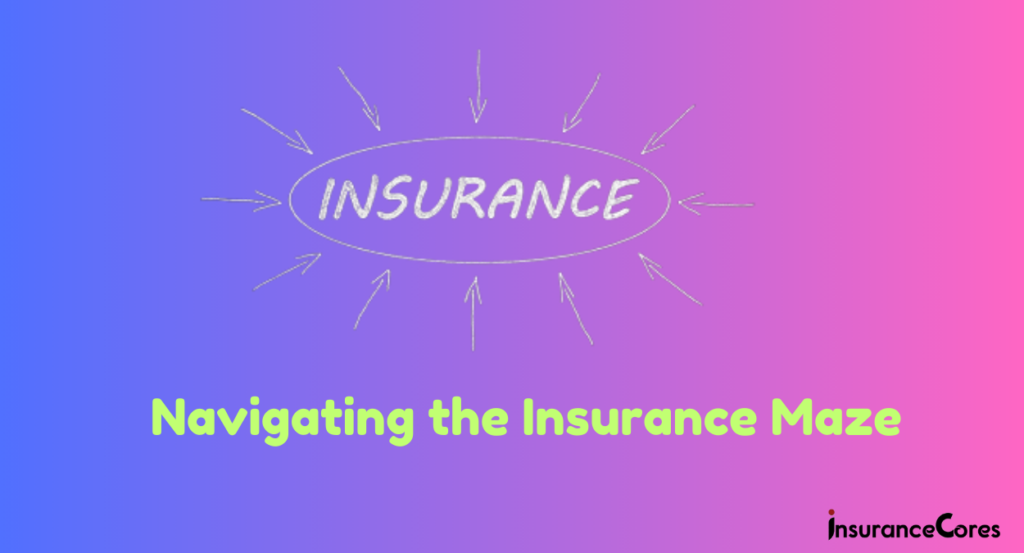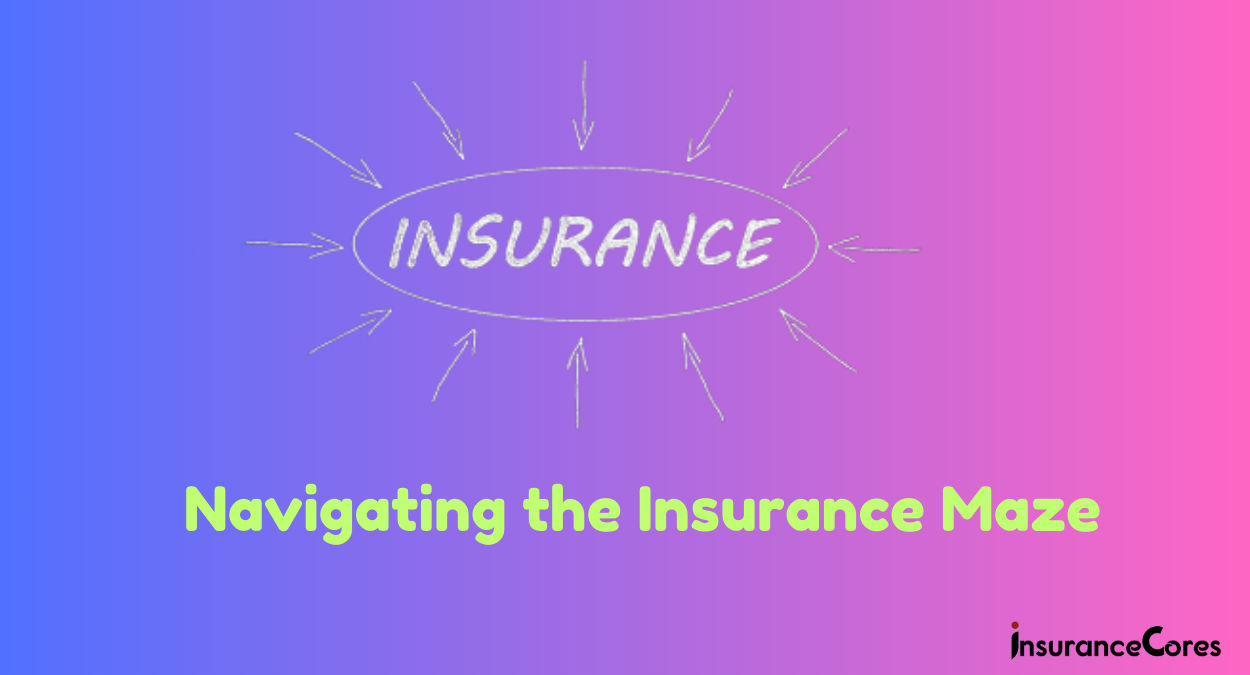Insurance Maze. Just hearing the word can make your eyes glaze over and your brain go into autopilot. But fear not, brave reader! We’re here to demystify the daunting world of insurance maze with a comprehensive guide that’s not only informative but also sprinkled with a bit of humor to keep you entertained. So grab a cup of coffee, sit back, and let’s navigate this insurance maze together.

Chapter 1: The Basics of Insurance Maze
What is Insurance?
Imagine this: You’re walking down the street, minding your own business, when suddenly a piano falls from the sky. Luckily, you dodge it (because you have great reflexes), but your car parked nearby isn’t so lucky. Who’s going to pay for that damage? Enter insurance.
Insurance is like that friend who always has your back when life decides to throw pianos at you. It’s a contract, represented by a policy, in which an individual or entity receives financial protection or reimbursement against losses from an insurance company. The company pools clients’ risks to make payments more affordable for the insured.
The Key Players
Understanding insurance involves knowing who’s who in this game:
- Insured: That’s you, the one buying the insurance.
- Insurer: The company selling the insurance maze.
- Premium: The amount you pay, often monthly, to keep your insurance active.
- Deductible: What you pay out of pocket before the insurance kicks in.
- Policy: The contract detailing what’s covered and what’s not.
- Claim: A request made to your insurance company for payment based on your policy’s terms.
Why Do You Need Insurance?
Because life is unpredictable. And not always in a “Wow, I just won the lottery!” kind of way. Sometimes it’s more like, “Oh no, my house just flooded and I didn’t even know I lived near water.”
Insurance maze helps you manage risk and provides a safety net when things go awry. It ensures that you don’t have to bear the full brunt of financial losses, making life’s unexpected moments a little more bearable.
Chapter 2: Types of Insurance
Now that we’ve got the basics down, let’s delve into the different types of insurance. Think of them as flavors in the ice cream shop of life.
Health Insurance
Probably the most talked-about and sometimes the most confusing. Health insurance covers medical expenses, doctor visits, hospital stays, and sometimes even prescription drugs. It’s like having a personal financial assistant for your health.
Why It’s Important: Medical bills can skyrocket faster than you can say “MRI scan.” Health insurance helps cushion the blow, so you’re not left choosing between your health and your wallet.
Auto Insurance
Whether you’re driving a clunker or a brand-new sports car, auto insurance maze is a must. It covers damage to your vehicle, injuries from accidents, and sometimes even damages to other people’s property.
Why It’s Important: Because accidents happen. Even to the best drivers. Plus, it’s illegal to drive without it in most places.
Homeowners/Renters Insurance
Your home is likely one of your biggest investments. Homeowners insurance covers damage to your home and belongings from things like fires, theft, and certain natural disasters. Renters insurance, on the other hand, covers your belongings if you’re renting.
Why It’s Important: Replacing all your belongings after a fire or theft would be a financial nightmare. This insurance makes sure you’re not left out in the cold—literally and financially.
Life Insurance
Nobody likes to think about it, but life insurance is crucial. It pays out a sum of money to your beneficiaries in the event of your death.
Why It’s Important: It ensures that your loved ones are taken care of financially when you’re no longer around to do so.
Disability Insurance
Disability insurance provides income if you’re unable to work due to a disability. Think of it as a safety net for your paycheck.
Why It’s Important: Bills don’t stop just because you can’t work. This insurance helps keep you afloat until you’re back on your feet.
Travel Insurance
Ever had your luggage lost or a flight canceled? Travel insurance maze covers these inconveniences and more, including medical emergencies abroad.
Why It’s Important: It provides peace of mind while you’re off exploring the world, knowing you’re covered if something goes wrong.
Chapter 3: Choosing the Right Insurance
Choosing the right insurance can feel like picking the right movie on Netflix—there are so many options, and you’re not sure what’s best for you. Here’s how to make it easier.
Assess Your Needs
Start by asking yourself these questions:
- What do I need to protect? (Health, car, home, life, etc.)
- What can I afford to pay out of pocket?
- What risks am I exposed to?
Compare Policies
Don’t just settle for the first policy you come across. Compare different policies and what they offer. Look at coverage limits, deductibles, and premiums.
Read the Fine Print
Yes, it’s boring. Yes, it’s necessary. The fine print contains crucial details about what’s covered and what’s not. You don’t want any surprises when you need to make a claim.
Consider Customer Service
Good customer service can make a world of difference, especially when you need to file a claim. Look for reviews and ratings of the insurance company’s customer service.
Seek Professional Advice
If you’re feeling overwhelmed, consider consulting with an insurance broker or financial advisor. They can help you navigate your options and find the best fit for your needs.
Chapter 4: Common Insurance Terms Explained
Insurance has its own language, and it can feel like you need a dictionary to understand it. Here are some common terms demystified.
Premium
This is the amount you pay for your insurance policy, usually monthly or annually. Think of it as your membership fee for the safety net club.
Deductible
The amount you’re responsible for before the insurance company starts paying. It’s like a cover charge before you can start dancing (or, in this case, filing a claim).
Copay
A fixed amount you pay for a covered health care service, usually when you receive the service. It’s your share of the medical bill.
Coinsurance
The percentage of costs you pay after you’ve paid your deductible. For example, if your coinsurance is 20%, you pay 20% of the costs, and your insurance covers the remaining 80%.
Exclusions
Things that your insurance policy doesn’t cover. These are the “we don’t cover this” items you need to be aware of.
Claim
A request you make to your insurance company for payment based on your policy’s terms. It’s like asking your friend to pay you back for that pizza you bought them last week.
Chapter 5: Filing an Insurance Claim
When something goes wrong and you need to file a claim, it can feel like navigating a maze. Here’s a step-by-step guide to make it easier.
Step 1: Contact Your Insurance Company
As soon as something happens, get in touch with your insurance company. They’ll guide you on the next steps and what documentation you’ll need.
Step 2: Gather Documentation
This can include photos of the damage, police reports, medical bills, and any other relevant information. The more detailed, the better.
Step 3: Submit Your Claim
Follow your insurance company’s process for submitting a claim. This might be online, via an app, or through a phone call.
Step 4: Wait for Assessment
An adjuster from the insurance company will review your claim and determine the payout. Be patient—this can take some time.
Step 5: Receive Payment
Once your claim is approved, you’ll receive payment according to your policy’s terms. Then you can start the recovery or repair process.
Chapter 6: The Funny Side of Insurance
Believe it or not, insurance can have its humorous moments. Here are a few to lighten the mood.
The Case of the Falling Coconut
A man in Florida successfully claimed insurance after a coconut fell on his head while he was relaxing on the beach. It just goes to show, you never know when life’s going to throw something unexpected at you—literally!
The Parrot That Started a Fire
In England, a homeowner’s insurance paid out after their pet parrot started a fire by knocking over a candle. Lesson learned: Never underestimate the destructive potential of a bored parrot.
A Whale of a Tale
A fisherman in Hawaii made an unusual claim after a whale collided with his boat. The insurance company initially thought it was a fishy story but eventually paid out after the tale was confirmed by witnesses.
Must Read:
- Quick info Automobile Industry Insurance: Best Way’s to Safeguarding Vehicles and Beyond in 2024
- Quick Way’s to Ultimate Guide for Long Term Health Care Insurance in the United States in 2024
FAQs: Frequently Asked Questions
Q: Do I really need insurance?
Q: What’s the difference between term and whole life insurance?
Q: What should I do if my claim is denied?
Conclusion
Navigating the insurance maze doesn’t have to be daunting. With a bit of knowledge and a sense of humor, you can find the right policies to protect yourself and your loved ones. Remember to assess your needs, compare policies, read the fine print, and don’t be afraid to ask for help. Life is unpredictable, but with the right insurance, you can face it head-on with confidence.
And if all else fails, just remember the guy who got hit by a coconut. If he can navigate the insurance world, so can you!
